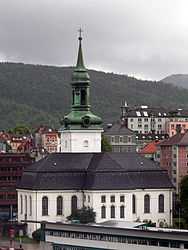Nykirken
| Nykirken | |
|---|---|
| "New Church" | |
|
View of the church | |
 Nykirken Location in Hordaland county | |
| 60°23′50″N 5°18′48″E / 60.3971°N 5.3134°ECoordinates: 60°23′50″N 5°18′48″E / 60.3971°N 5.3134°E | |
| Location | Bergen, Hordaland |
| Country | Norway |
| Denomination | Church of Norway |
| Churchmanship | Evangelical Lutheran |
| History | |
| Founded | 1622 |
| Architecture | |
| Status | Parish church |
| Functional status | Active |
| Architect(s) | Johan Joachim Reichborn |
| Completed | 1763 |
| Specifications | |
| Capacity | 750 |
| Materials | Stone |
| Administration | |
| Parish | Bergen domkirke |
| Deanery | Bergen domprosti |
| Diocese | Diocese of Bjørgvin |
Nykirken (literally: "The new church") is a parish church in Bergen municipality in Hordaland county, Norway. It is located in the Nordnes area of the city of Bergen. The church is part of the "Bergen domkirke" parish in the Bergen arch-deanery in the Diocese of Bjørgvin.[1][2][3]
The large, white, stone, cruciform church is located at the "Nykirkeallmenningen" square between the Strandgaten road and Vågen bay. Although it is generally known as the Nykirken, it was consecrated in 1622 by Bishop Nils Paaske as "Holy Trinity Church". When the church was originally built in 1622, there were several other churches in Bergen that were already several hundred years old, so this church was nicknamed "the new church", a name which has stuck for centuries. It is also (probably) an appropriate nickname, since the churches on this site have burned down several times and then been rebuilt, so it literally is usually the "newest" church in the central city. The current building dates back to 1764 when it was completely rebuilt and redesigned after a major fire. It has been significantly rebuilt several times since then, too, following various fires.[4]
The church was a parish church for the Nykirken parish in central Bergen from 1622 until 2002. In 2002, several urban parishes in central Bergen were merged together to form the "Bergen domkirke" parish. The Nykirken is still in regular use, but it has been given a special emphasis as a "children's church", putting a special emphasis on children and their families. Since 2002, the parish has started calling the church the "Children's Cathedral".[5]
History
The church was originally built in 1621 on the site of the ruins of the home of the archbishop, a stone building that was built in the 14th century, and was destroyed by fire.[6] The original church building only stood for two years before it burned down in 1623. It was immediately rebuilt.[3] In 1660, the second church building was destroyed by fire and again rebuilt in 1670. Another fires happened in 1756. The church was replaced in 1974 by the current church building. There was another smaller fire in 1800, followed by a restoration of the building.[3]
On 20 April 1944, during World War II, the church was once again significantly damaged by fire when the German ship Voorbode exploded in the nearby Vågen bay leaving large parts of the city of Bergen in ruins.[7][8] The reconstruction followed the plans of the Baroque/Rococo-style church built after the fire in 1756, including the spire called for in these plans but not built.[3] Johan Joachim Reichborn is the architect.[9]
Internal features
The church has 750 seats, somewhat less than before 1944.[3] The great majority are in high-sided box pews, although there are also some painted wooden benches, more suitable for children.
The church is informally known as 'the Children's Church' following the desire of a former Bishop of Bergen to develop this use. In consequence the interior has been largely decorated by local children. These decorations include hand-painted icons, hanging mobiles, and large paintings that have been set into double-glazing panels to form a stained-glass effect at every window in the main church building.
The 'Baptismal Angel' is a massive carved angel which descends from the ceiling of the church by means of a pulley system, bearing in its hand the bowl for infant baptsms. The original was donated in 1794 in memory of Heinrich Pütter,[4] but was destroyed in the 1944 explosion. The replacement was donated by the nearby Bergen Cathedral, who had always been the owners of the matching angel, but kept it unused in storage. The mechanism for the angel is now electrically operated.
See also
References
- ↑ "Nykirken i Bergen". Kirkesøk: Kirkebyggdatabasen. Retrieved 2014-08-17.
- ↑ "Oversikt over Nåværende Kirker" (in Norwegian). KirkeKonsulenten.no. Retrieved 2014-08-17.
- ↑ 3.0 3.1 3.2 3.3 3.4 Hartvedt, Gunnar Hagen (1994). "Nykirken". Bergen Byleksikon (in Norwegian). Oslo: Kunnskapsforlaget. p. 354. ISBN 82-573-0485-9.
- ↑ 4.0 4.1 Nykirken i Bergen (in Norwegian, German, and & English), Bergen: Nykirken (church guide), p. 4
- ↑ "Nykirken - Barnas Katedral" (in Norwegian). Bergen domkirken menighet.
- ↑ Hartvedt, Gunnar Hagen (1994). "Erkebispegården". Bergen Byleksikon (in Norwegian). Oslo: Kunnskapsforlaget. p. 168. ISBN 82-573-0485-9.
- ↑ Lavik, Per Jahn (1993). Brekke, Nils Georg, ed. Kulturhistorisk vegbok Hordaland (in Norwegian). Bergen: Hordaland Fylkeskommune. p. 70. ISBN 82-7326-026-7.
- ↑ Henriksen, Petter (ed.). "Vågen – eksplosjonskatastrofen 1944". Store norske leksikon (in Norwegian). Kunnskapsforlaget. Retrieved 12 June 2009.
- ↑ Indahl, Trond. "Johan Joachim Reichborn". Norsk biografisk leksikon. Oslo: Kunnskapsforlaget. Retrieved 22 June 2009.
| ||||||||||
